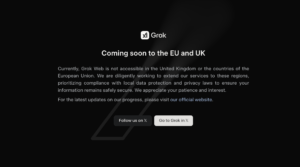Digital Fortress Europe: Fortress of Regulations

US Innovates.
China Replicates.
EU Regulates.
This is the view of many observers who want to describe the strengths of the three power blocs of the USA, China, and Europe in a nutshell. And indeed: whether you compare GDPs, the number of unicorns, the largest companies, patent applications, corporate research spending, funding for future technologies, or investments in new energies, the EU usually comes out on the short end. The only thing the EU can do now, it seems, is to come up with new rules to keep the other power blocs and their exports somehow under control.
Neoom CFO Philipp Lobnig once cynically described Europe to me as an “open-air museum and retirement home” – a continent of aging, but still a holiday destination for Americans and Asians who want to see the old metropolises of London, Paris, Berlin, and Rome. But what else? There is no European company in the top 10 of the most valuable companies in the world, just one in the top 20 (Novo Nordisk from Denmark), and at least 6 in the top 50 (Roche, Hermes, Nestle, LVMH, ASML and Novo Nordisk). The USA has 32.
Unicorn Europe’s dreams have been shattered
To oppose the oppressive market power of the big tech giants Apple, Microsoft, Google, Amazon, Nvidia, or Meta with their own companies was the wet dream of some who conjured up “Silicon Roundabouts/Alleys/Villages/Cities/etc” and unicorn factories in various places in Europe, but there is little to no sign of any of this. The biggest IPO of the year in Europe will probably be that of the Chinese online retailer Shein in London. Continental Europe also plays no role in IPOs.
In 2021, when a rain of money artificially created by the aftermath of COVID (“digitalization turbo” plus helicopter money from Western governments) caused European unicorns to spring up one after the other, one could still dream of a Renaissance of Europe 2.0. Today we know that the dream of an independent Europe with its own digital champions has not come true. Macron’s post-COVID ambitious goals of creating ten €100 billion tech companies in Europe by 2030 are unrealistic from today’s perspective.
EU launches antitrust lawsuit against Microsoft over Teams integration
EU: 4 new regulations for everything digital
So what has the Old Continent switched to? A skill that the EU is very good at – regulation. Regulations and guidelines are being put in place one after the other to try to limit the market power of the US tech giants in particular. 2024 can be seen as a turning point in regulation, because this year, in addition to the two major levers against Big Tech,
- Competition law
- Data protection law (GDPR)
There are four additional EU regulations and directives that have a major impact on how digital business has been done so far:
- Digital Markets Act (DMA)
- Digital Services Act (DSA)
- AI Act
- MiCA (Markets in Crypto Assets)
The first effects of this can be seen now. Apple did not dare to launch its new AI functions in the EU in the fall under the collective term “Apple Intelligence”; before that, Meta Platforms decided against activating Meta AI for European users of Facebook, Instagram and WhatsApp and instead focused on India; for many new AI models such as GPT-4 from OpenAI, the AI Act will ensure restricted usage options; and the stablecoin Tether (USDT), essential for crypto trading, has to fear of being banned in the EU.
The EU is no newcomer to the field of regulation. Over the past 20 years, Microsoft, Meta, Amazon, Apple, and especially Google have been hit with hefty fines, either for violating competition law or the General Data Protection Regulation (GDPR). Here is an overview of the largest fines against Big Tech so far:
| Big-Tech | Fine in € | violation | Year | authority |
| 4.3 billion | Abuse of Android | 2018 | EU Commission | |
| 2.4 billion | Preference for Google Shopping | 2021 | EU Commission | |
| Apple | 1.8 billion | Restriction of music streaming | 2024 | EU Commission |
| 1.5 billion | Abuse of online advertising | 2019 | EU Commission | |
| Meta | 1.2 billion | Violation of GDPR | 2023 | Irish Data Protection Authority |
| Microsoft | 899 million | unjustified license fees | 2008 | EU Commission |
| Amazon | 746 million | Violation of GDPR | 2021 | Data Protection Authority in Luxembourg |
| Microsoft | 561 million | Restricting browser choice in Windows | 2013 | EU Commission |
| Meta | 405 million | GDPR violation on Instagram | 2022 | Irish Data Protection Authority |
| Meta | 265 million | GDPR violation at Facebook | 2022 | Irish Data Protection Authority |
| Meta | 225 million | WhatsApp breaches GDPR | 2021 | Irish Data Protection Authority |
With DMA, DSA and AI Act, it is already clear that things will continue in this vein – next, it is rumored, will be Apple and Microsoft being hit with hefty (billions?) fines.
From the frenemy phase to the enemy phase
So far, Google, Meta, and others have been able to cope with these fines. Or rather, even these billion-dollar fines have not even put a dent in Big Tech’s growth. Apple, Microsoft, Alphabet, Amazon, and Meta are now worth more than ever before and are making more sales and profits than ever – a billion-dollar fine is not that dramatic. The question that will arise in the future is: how high do the fines have to be for Big Tech to really feel the impact?
The DMA in particular will bring a new quality to this. Not only could fines of ten percent of global annual turnover be imposed (in Apple’s case, this would theoretically be a whopping $38 billion for 2023), but the companies could even be broken up. In theory, it could be decided that Google would have to spin off YouTube, Meta Instagram, or Apple thee App Store or Apple Music. The fact that the DMA is feared is already shown by the fact that the big tech companies will not launch certain services in the EU for the time being.
Who can grow without the app store, social media, and search?
This development is doubly disadvantageous for Europe: firstly, services that have not been launched mean that they cannot be punished (for all those who think that the EU Commission can at least impose fines), and secondly, consumers and companies simply have fewer services available in global competition. There are hardly any digital businesses that can grow without the app stores, cloud services, video platforms, messaging services, search engines, and social networks of the gatekeepers, as defined by the DMA.
Until now, Google, Apple, and Co have been willing to accept regulations and penalties in order to be able to participate in the European market. They were “frenemies”, but some observers now believe that the half-friend-half-enemy phase is soon over and Google and Co could become real “enemies”. “As the EU’s share of the global economy continues to shrink, it is becoming easier and easier for companies to avoid it and its regulations,” comments Paris-based VC Michael Jackson. Instead of struggling with the numerous regulations, the effect could be that Apple and Co. simply do not launch in the EU at all and focus on other markets.
These are just a few examples, but if the trend becomes widespread, it will become an enormous problem. A “Digital Fortress Europe” would emerge, which, behind walls of regulations, rules, and prohibitions, would increasingly work with technologies that are no longer “state of the art” from a global perspective – and which would lack the strength to develop and export the relevant technologies and to be able to compete globally.




























